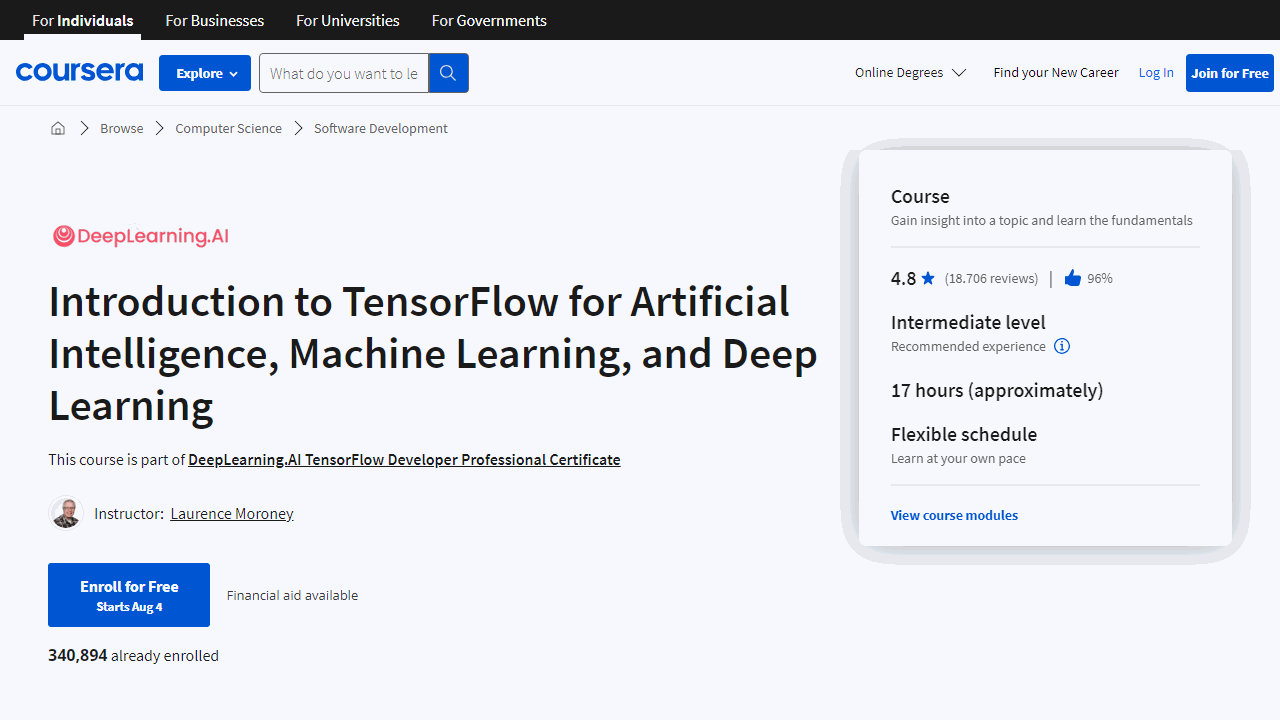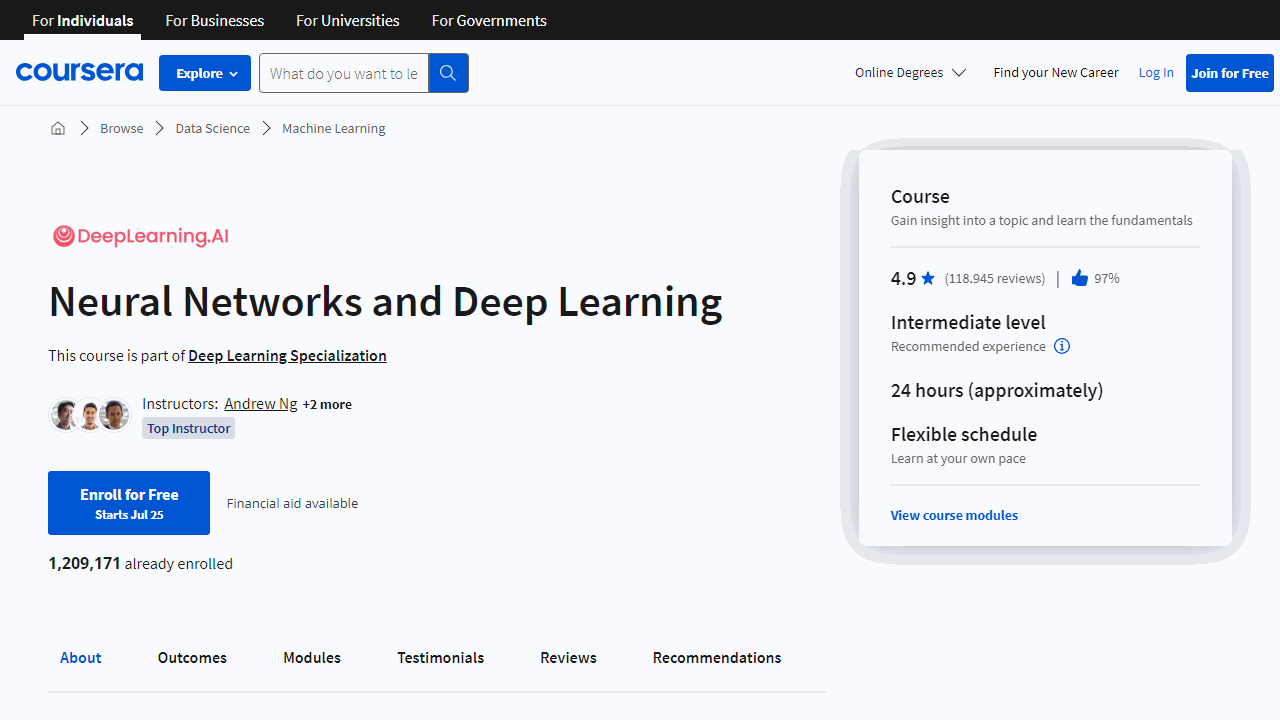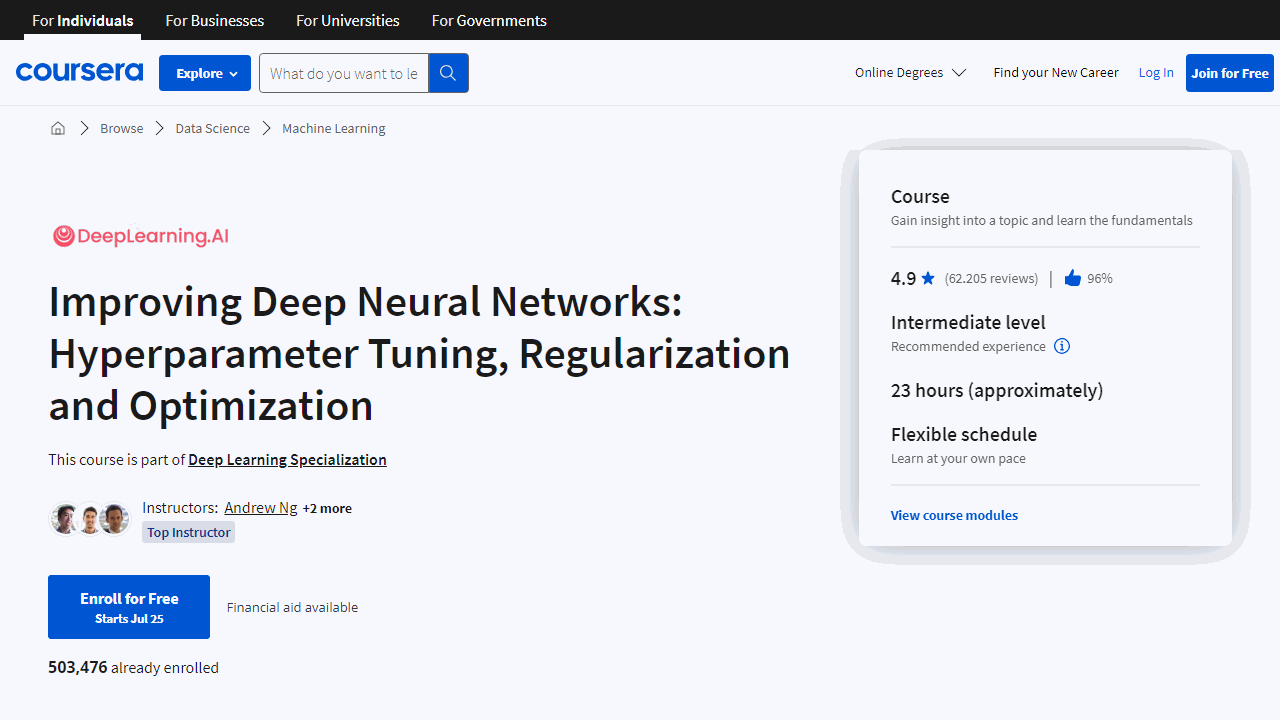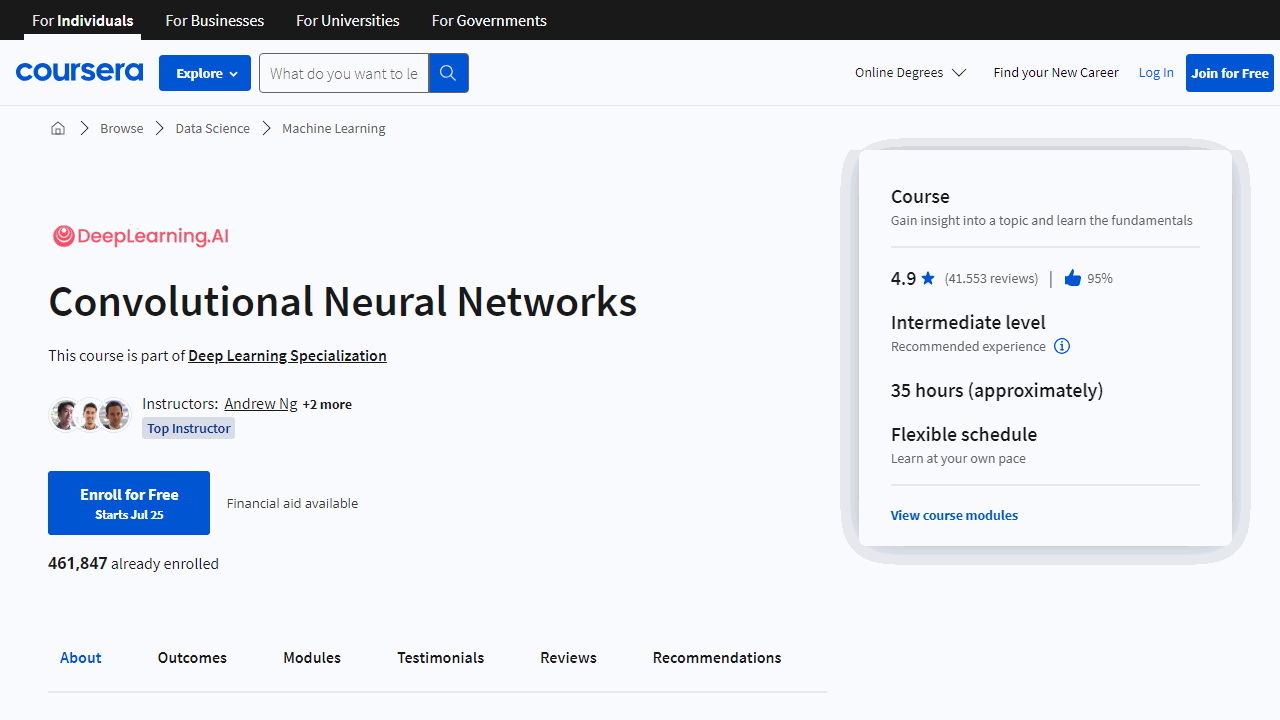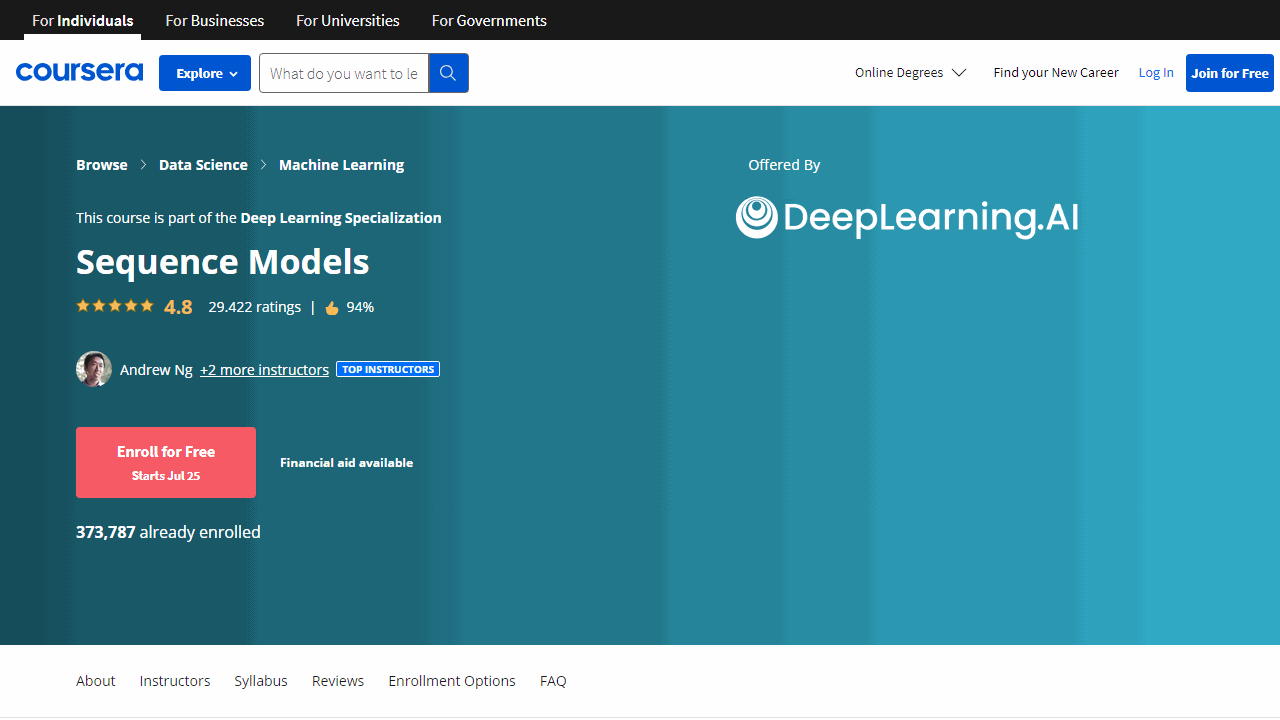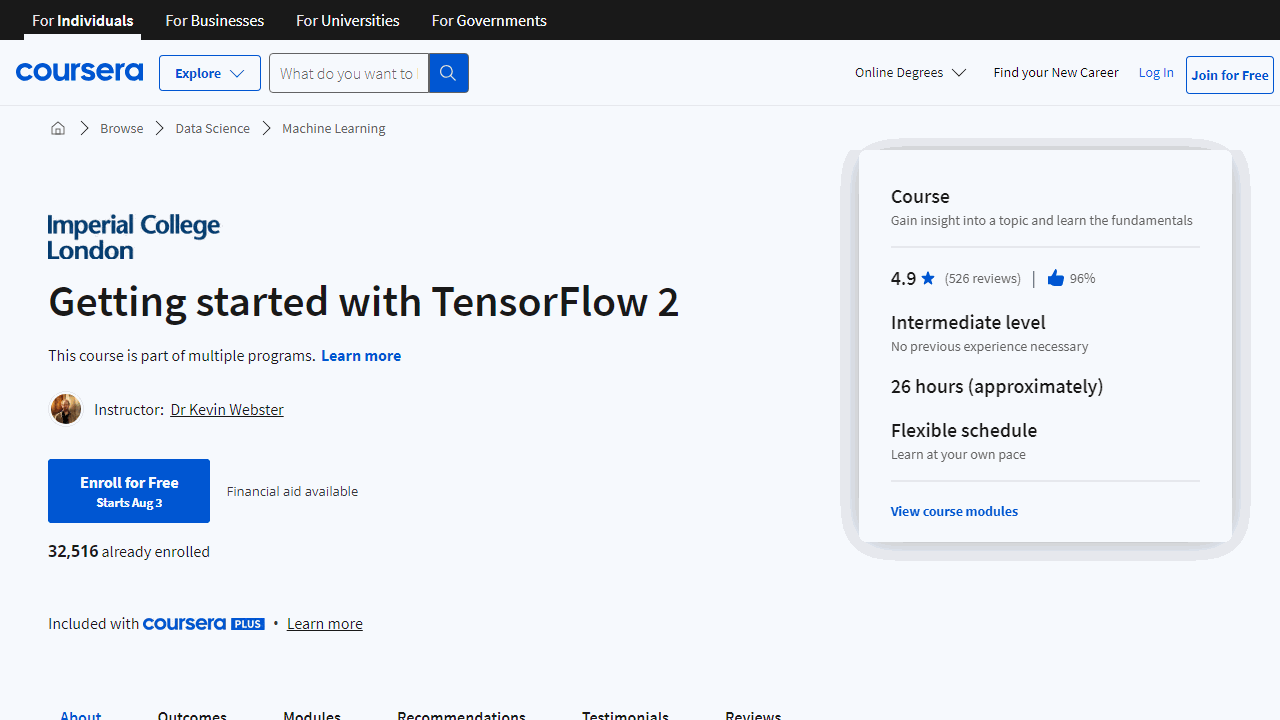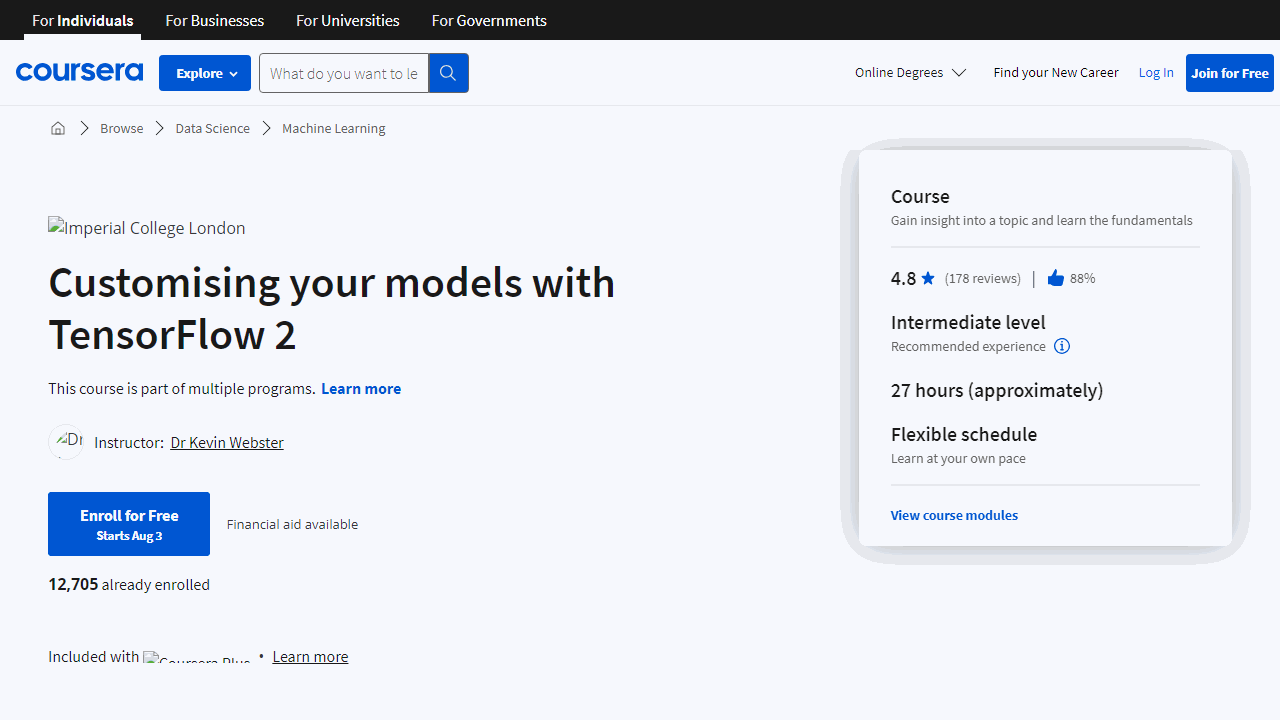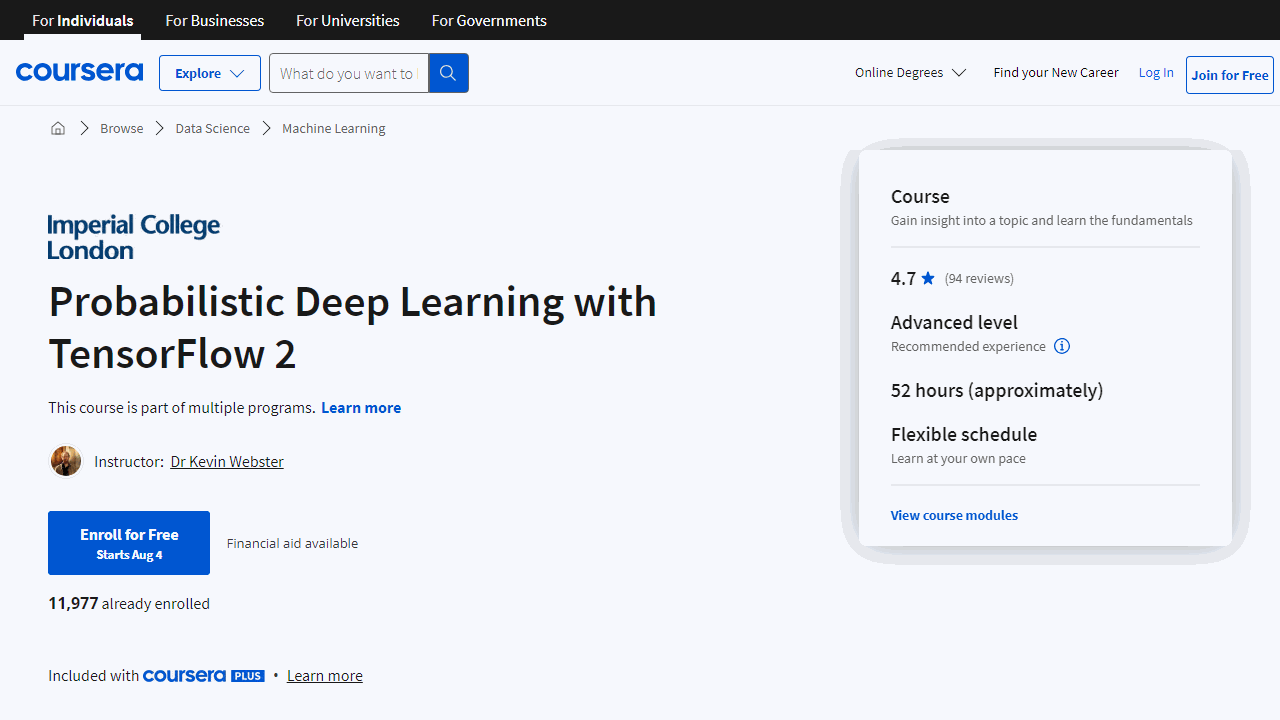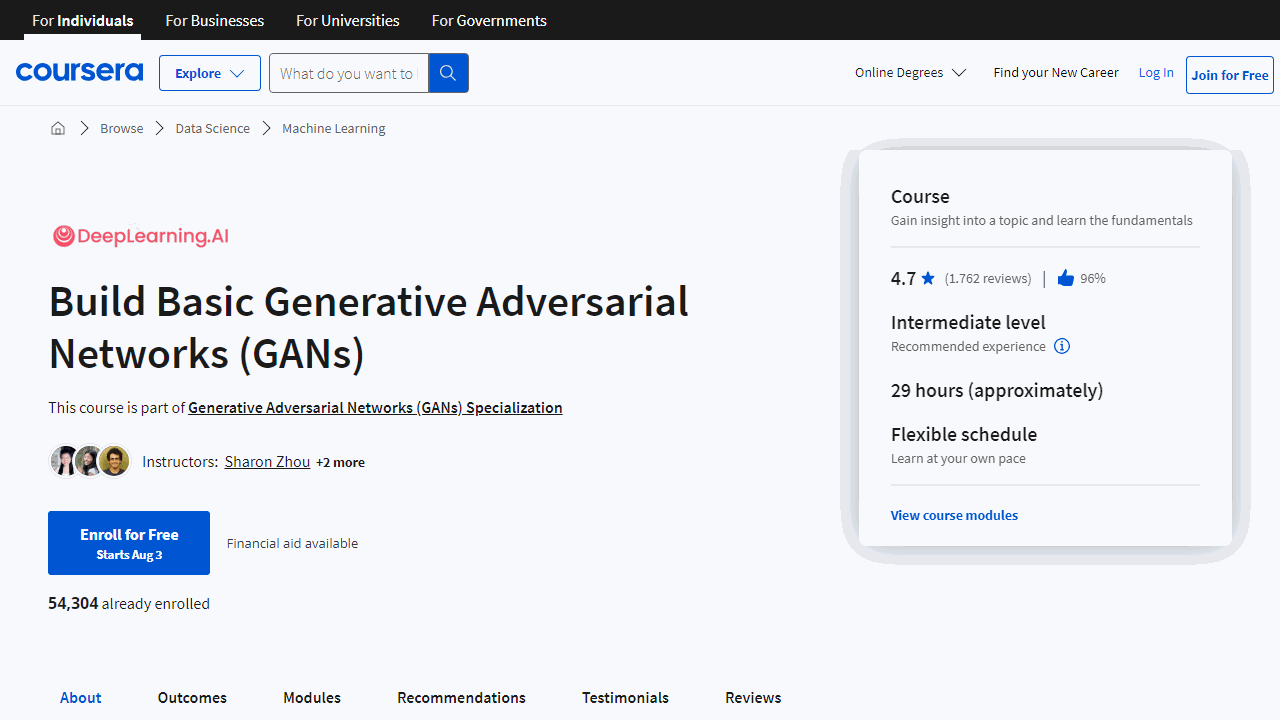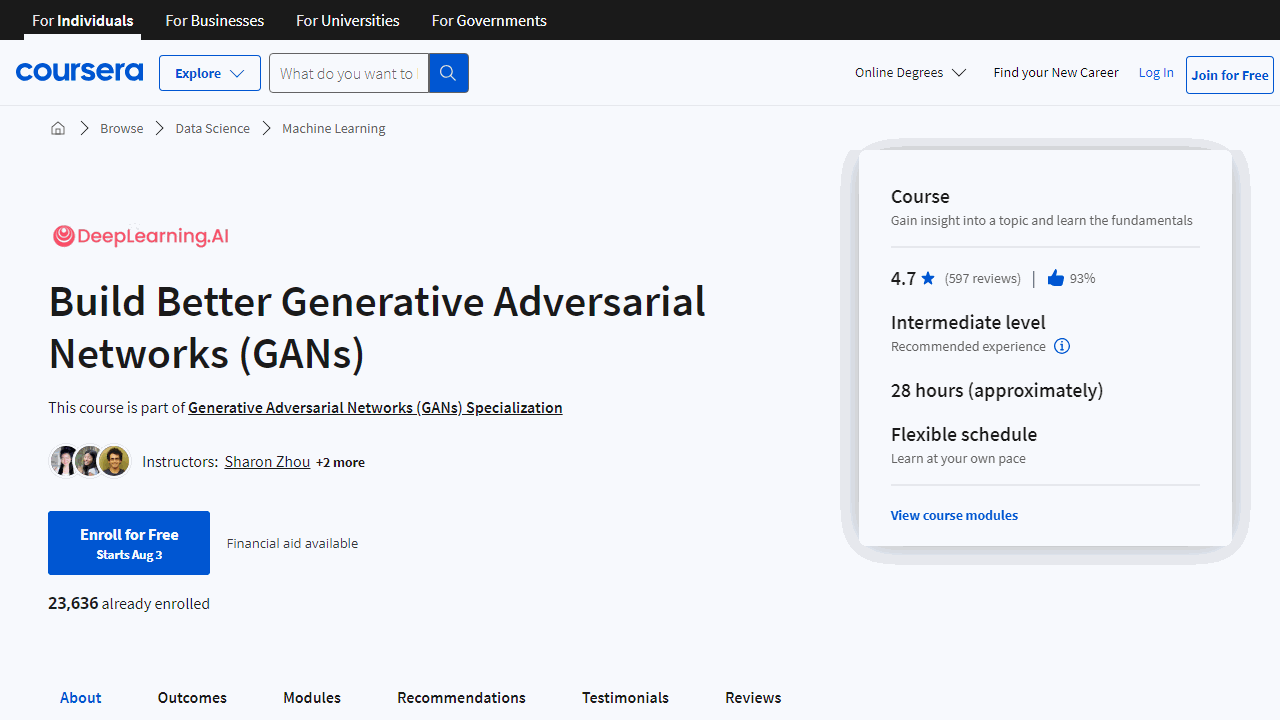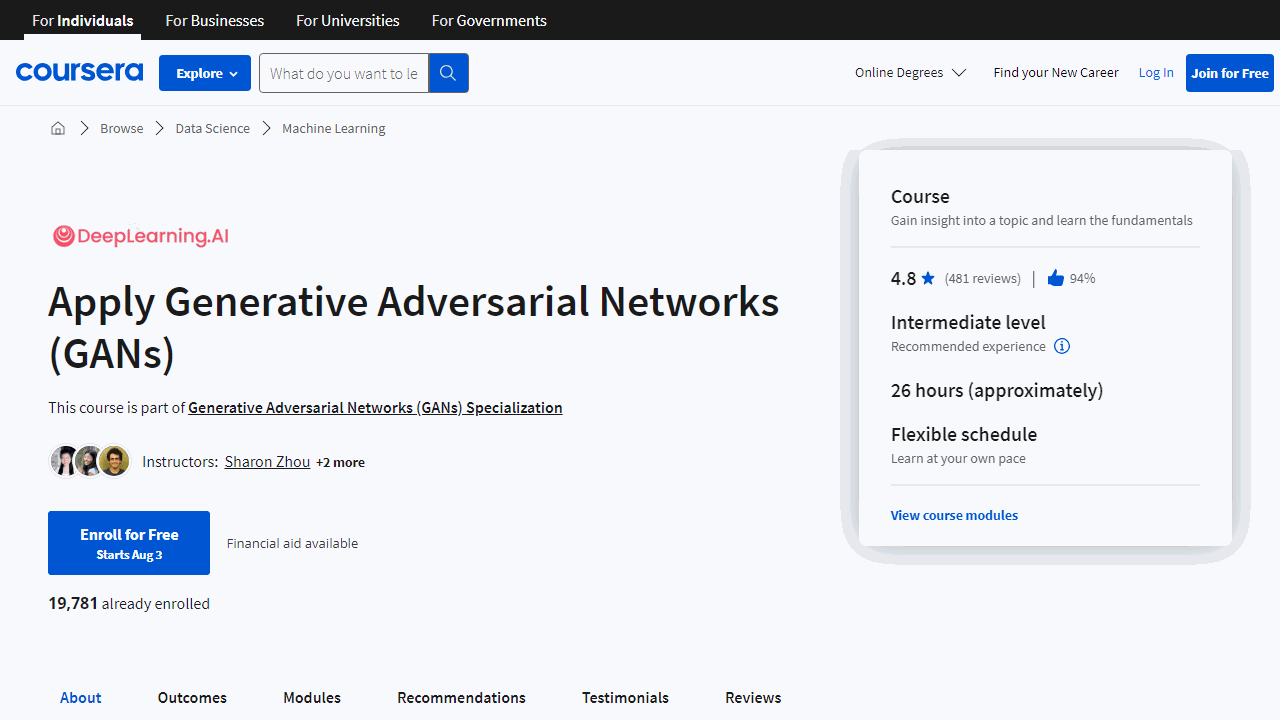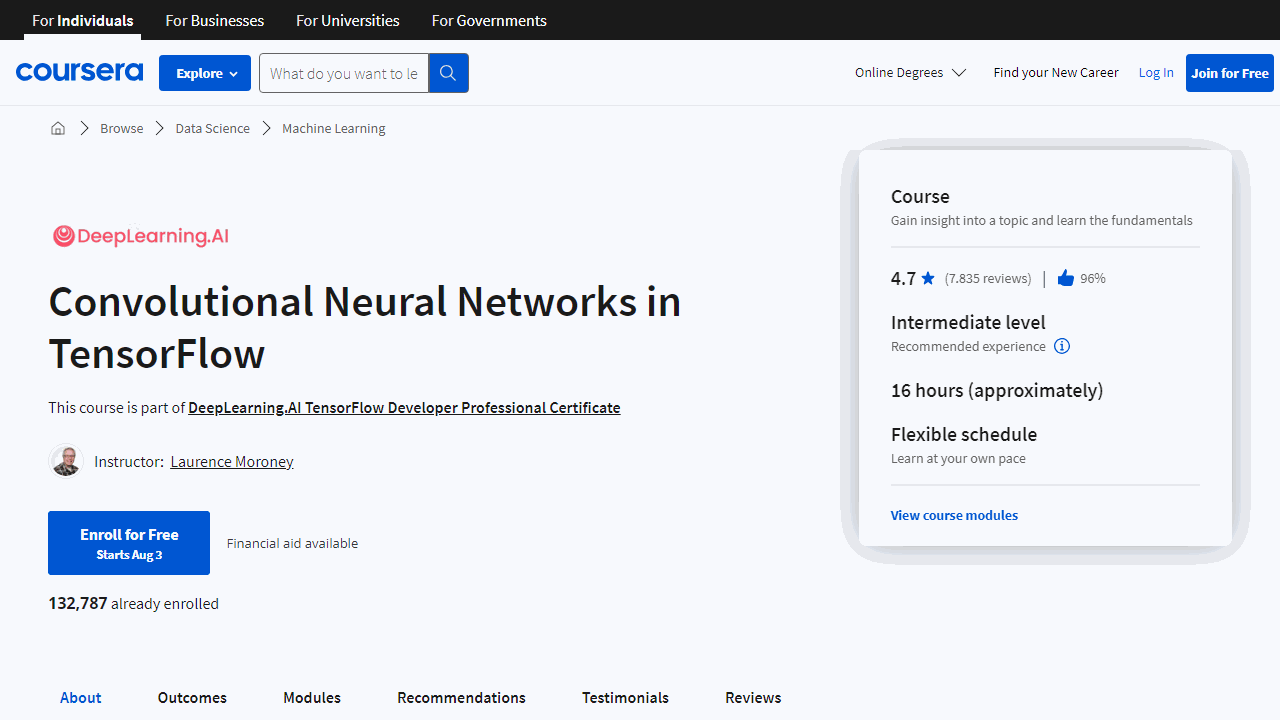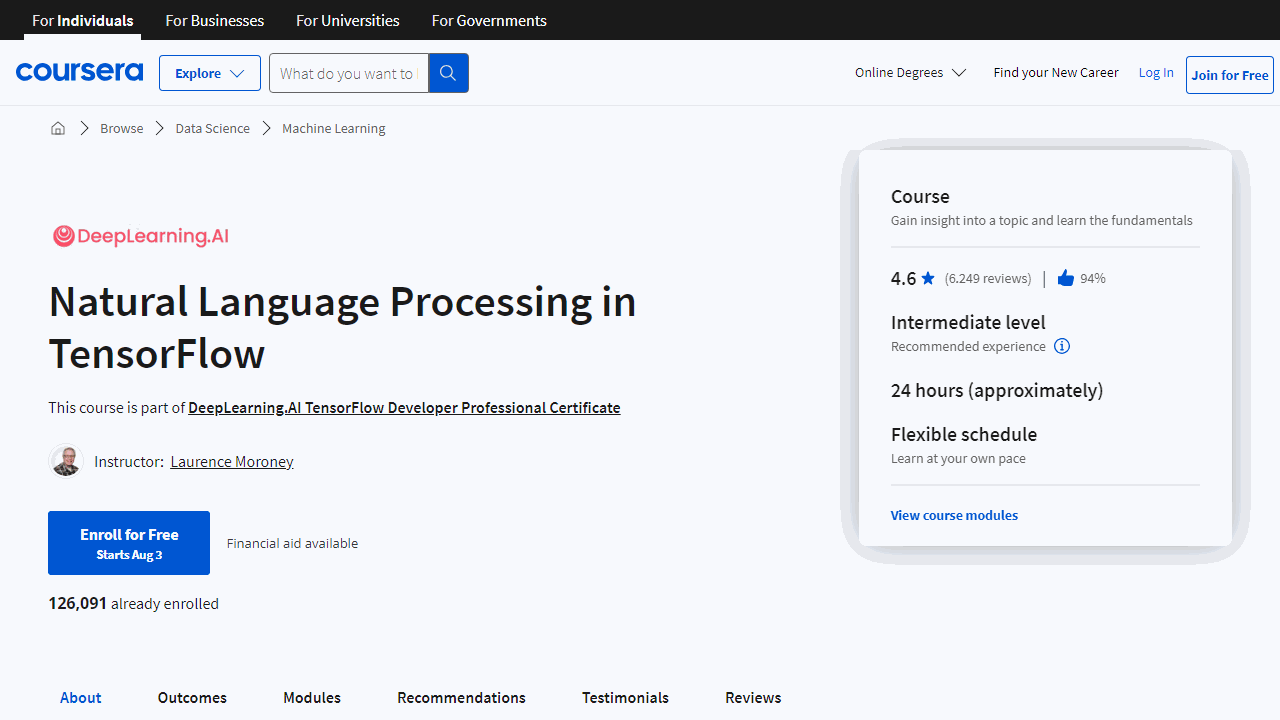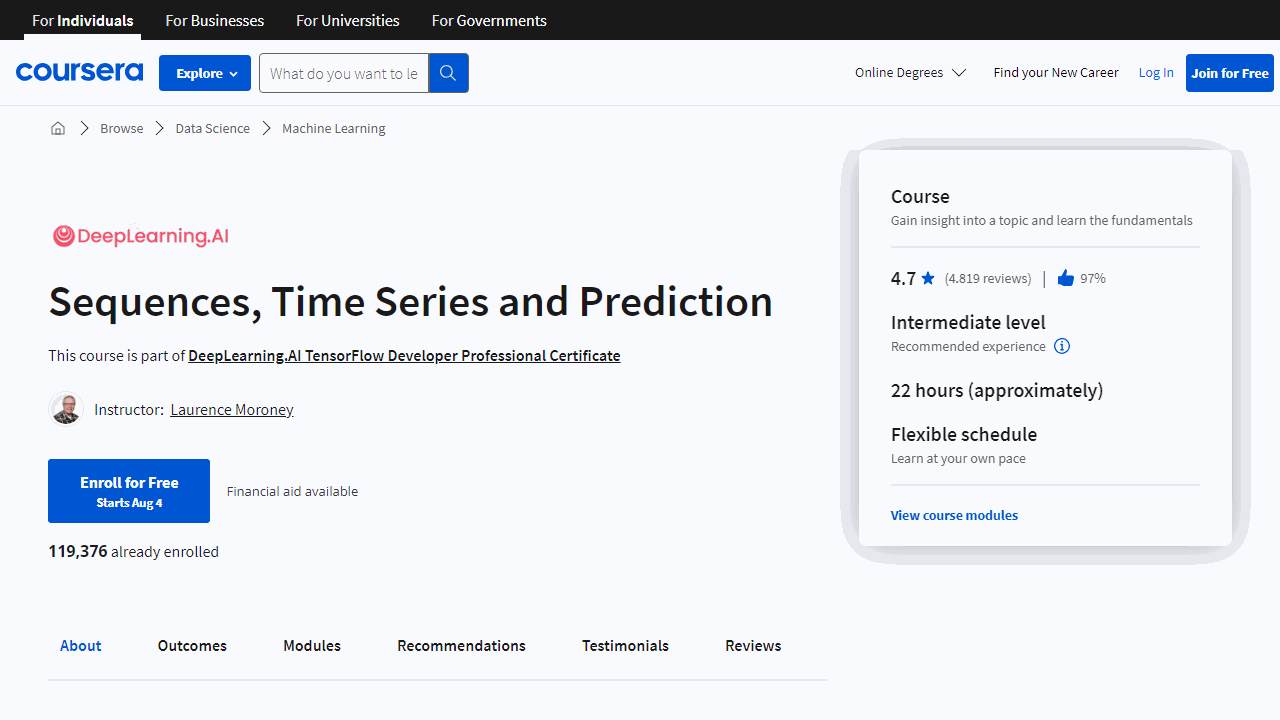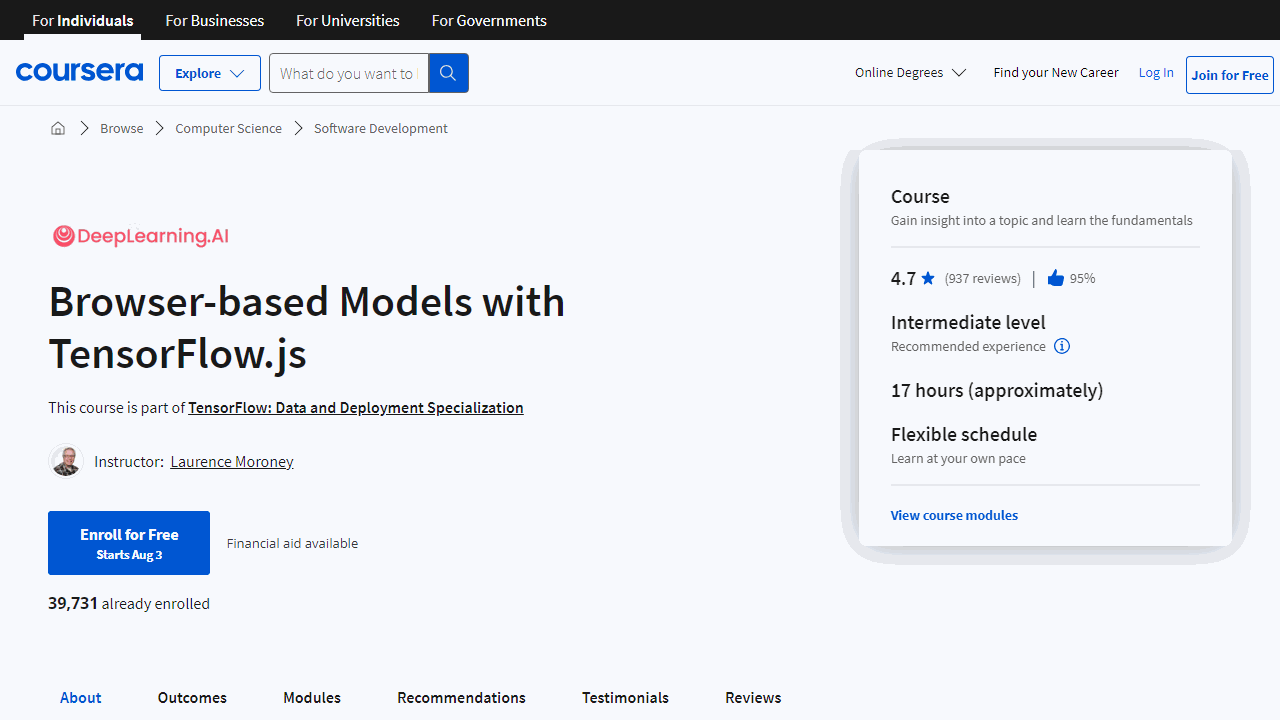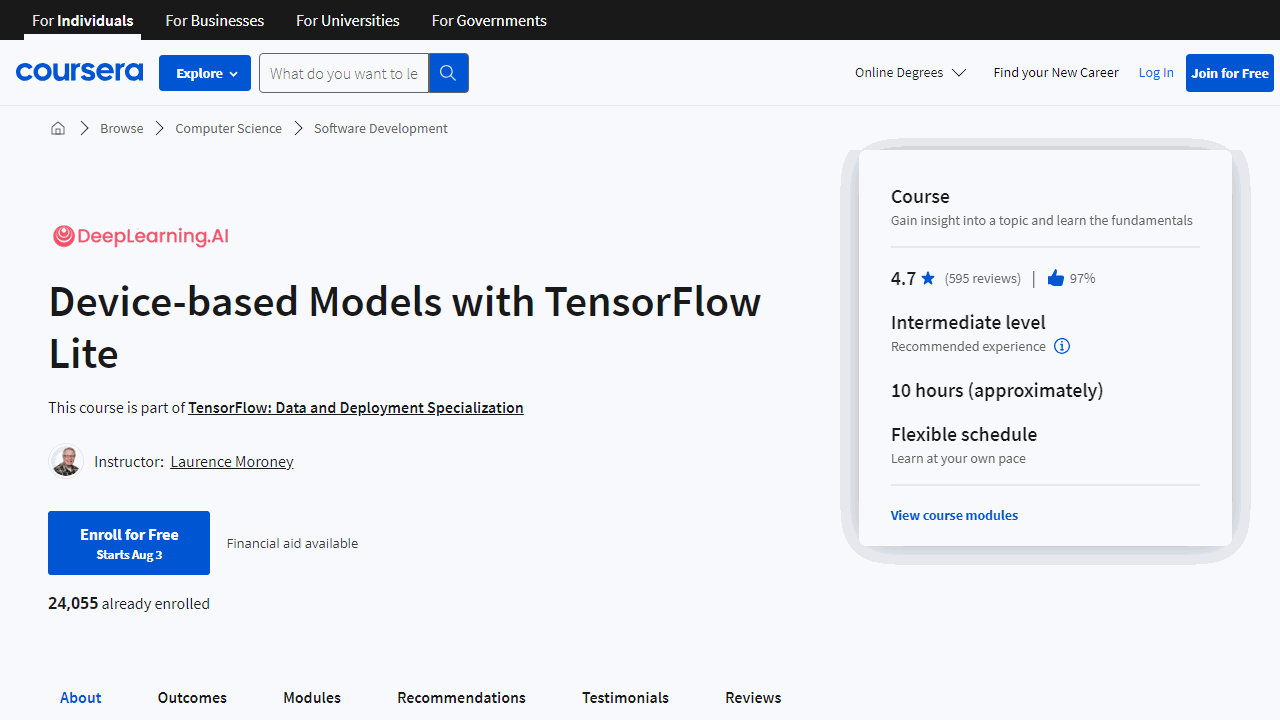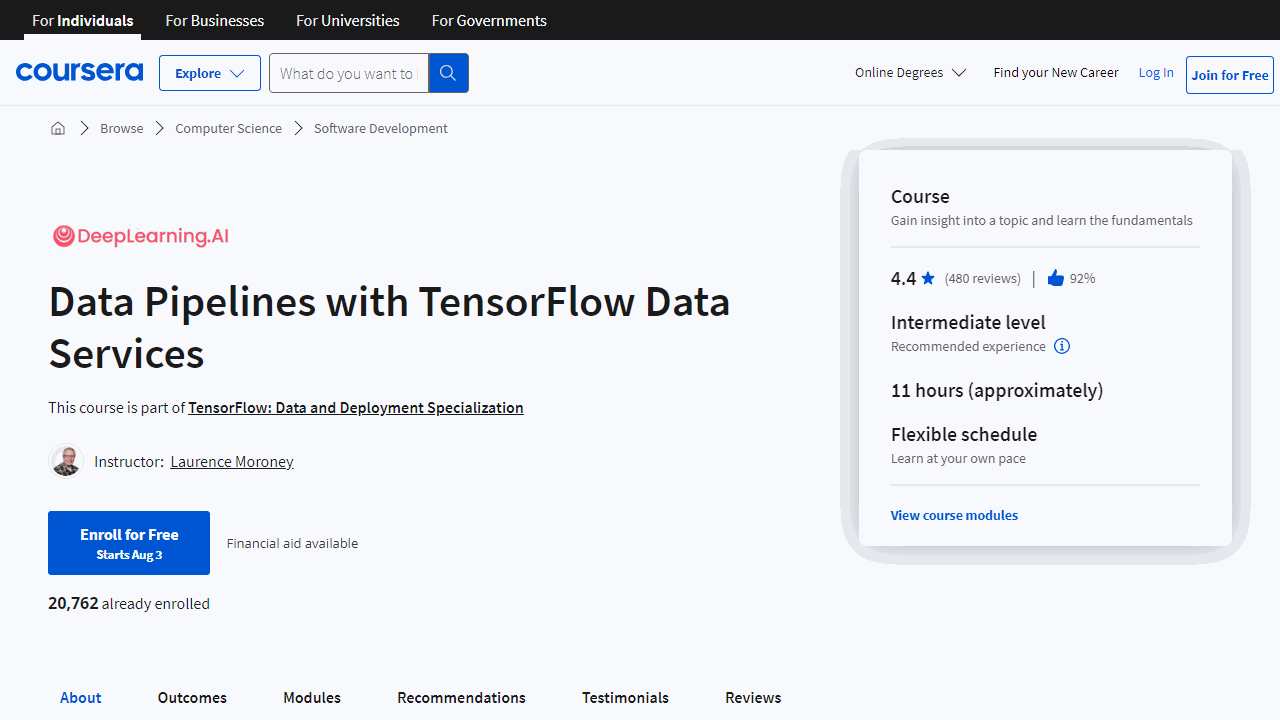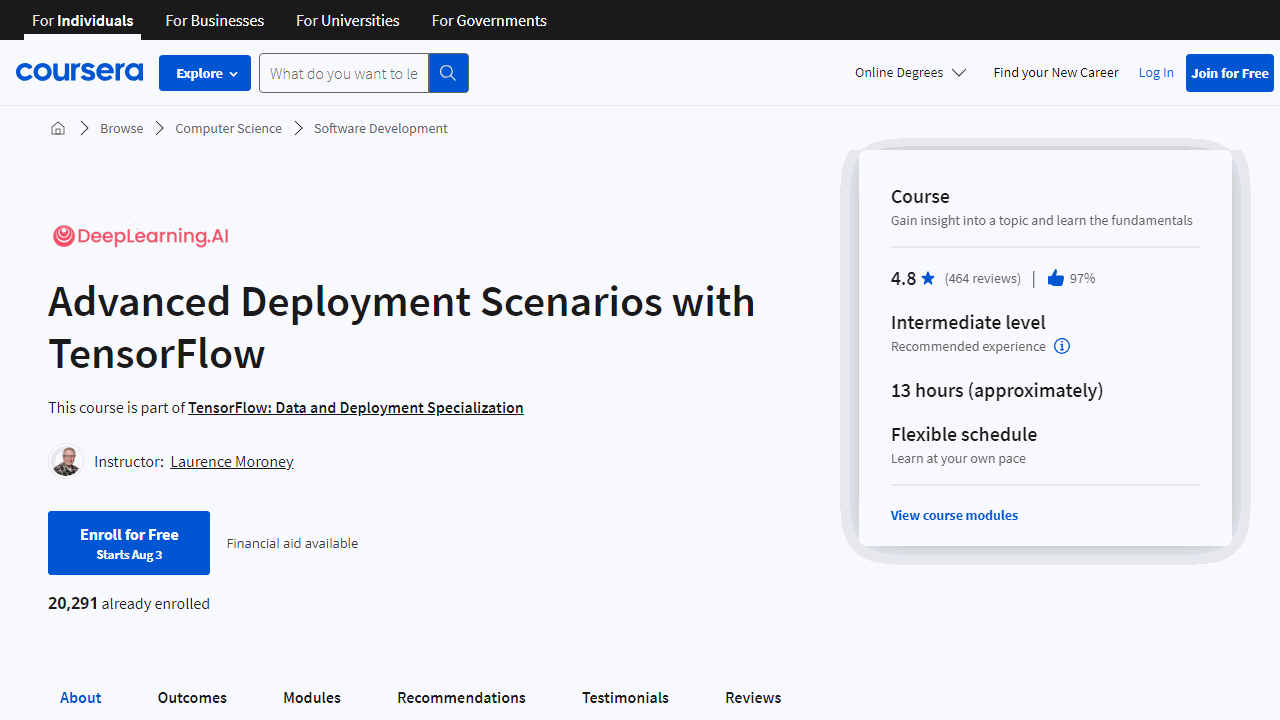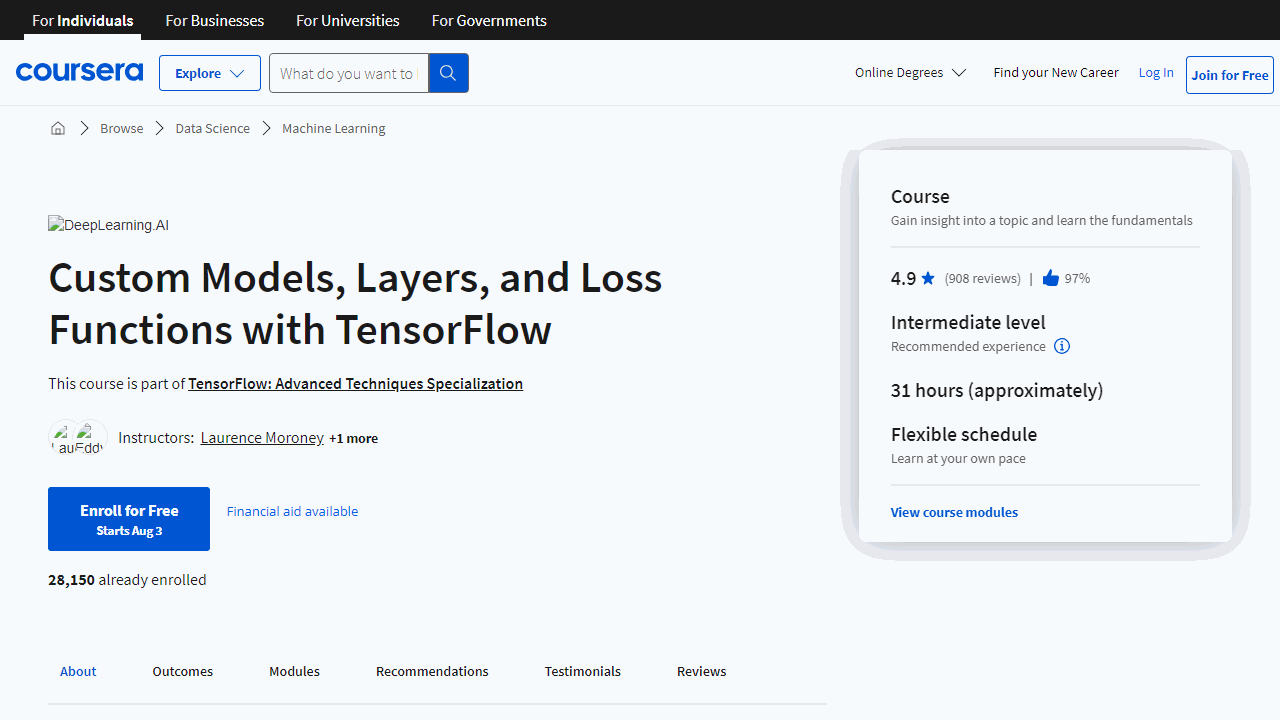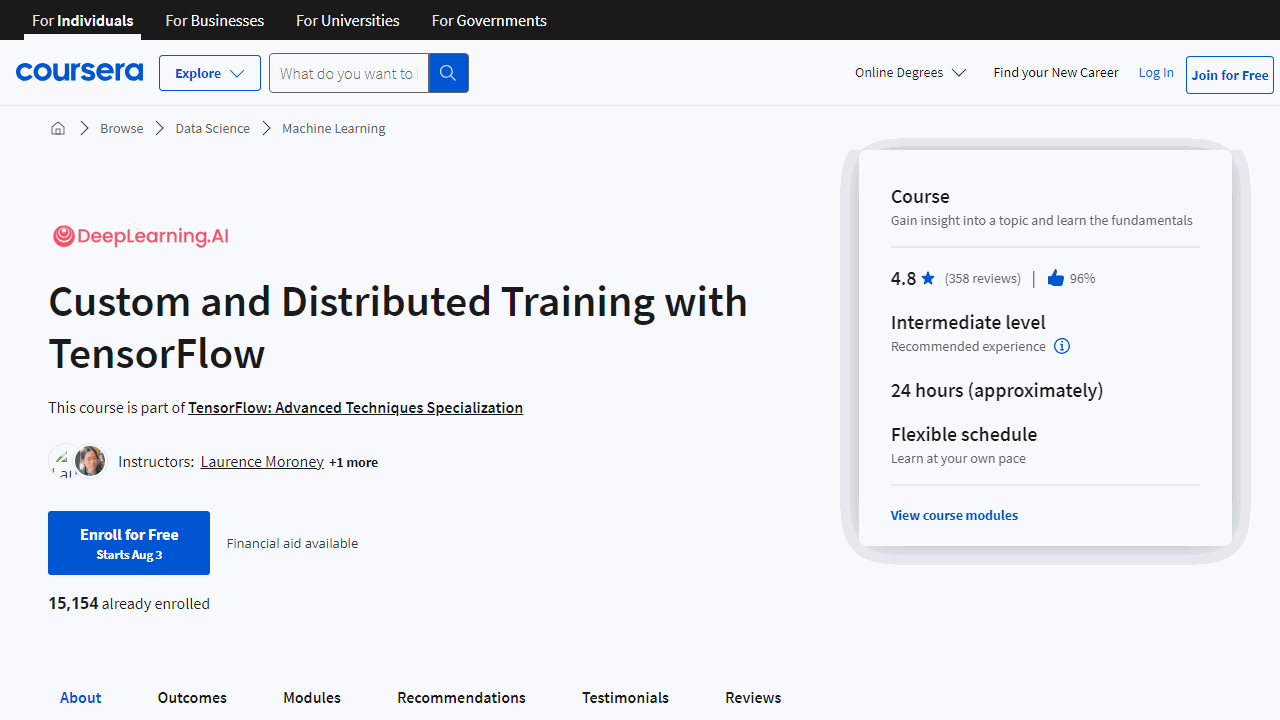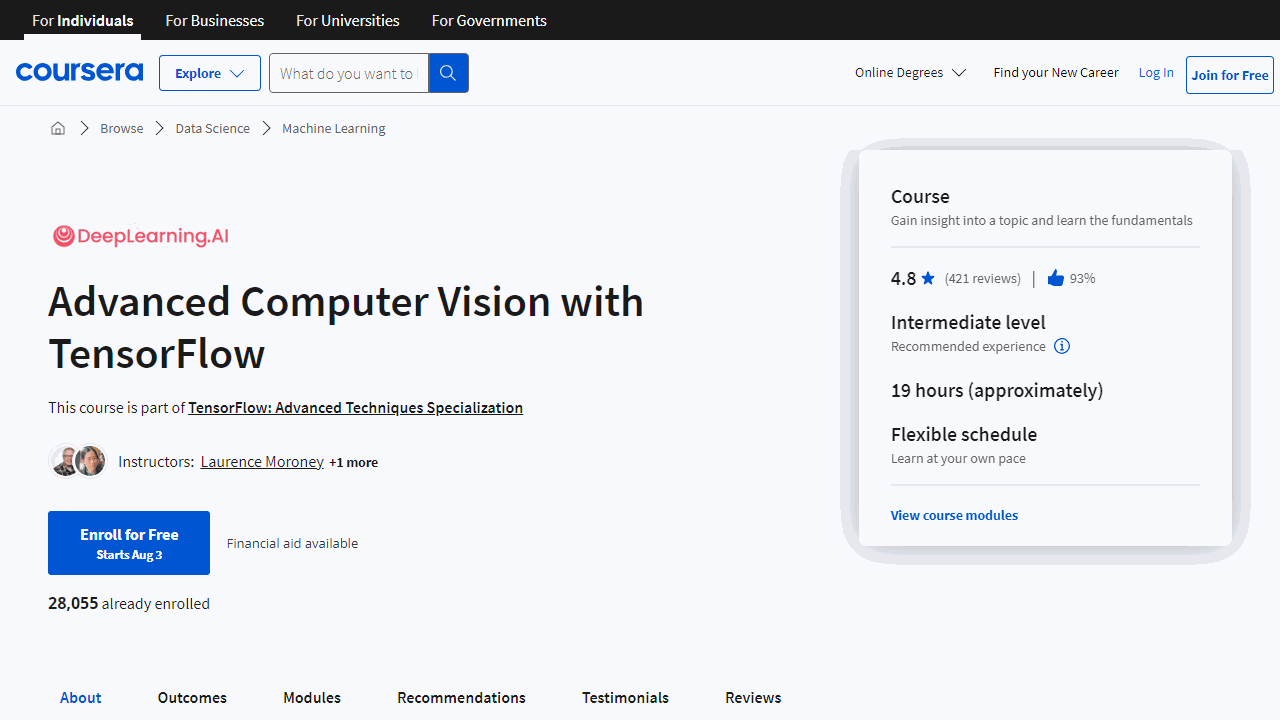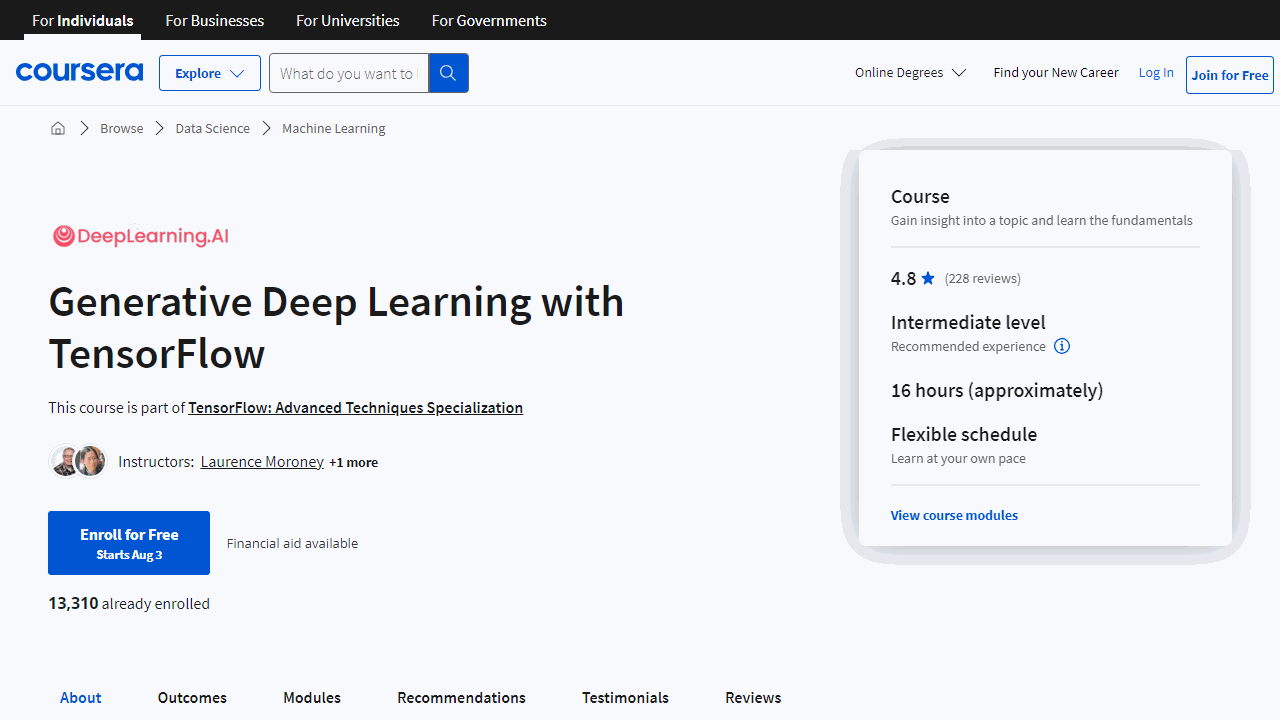Deep learning is a powerful subset of artificial intelligence that uses artificial neural networks to learn from data, enabling computers to perform tasks that were previously thought to require human intelligence, such as image recognition, natural language processing, and even playing games.
By mastering deep learning, you can gain valuable skills that are highly sought after in various industries, including tech, finance, and healthcare.
Finding the right deep learning course on Coursera can be challenging, especially with so many options available.
You’re looking for a program that is comprehensive, engaging, and taught by experts, but also fits your learning style and goals.
For the best deep learning course overall on Coursera, we recommend the Deep Learning Specialization by DeepLearning.AI and Stanford University.
This program is led by renowned AI expert Andrew Ng and is a comprehensive five-course journey that takes you from the basics of neural networks to advanced topics like convolutional neural networks and recurrent neural networks.
This specialization is designed to equip you with the practical skills and theoretical knowledge needed to build a successful career in deep learning, and it is known for its engaging lectures, challenging assignments, and insightful case studies.
While the Deep Learning Specialization stands out as our top pick, there are many other great courses available on Coursera that focus on various aspects of deep learning.
Keep reading to discover a curated list of other top-rated courses, including specializations dedicated to TensorFlow and Generative Adversarial Networks (GANs), as well as individual courses tailored to specific deep learning techniques and applications.
Deep Learning Specialization
- Provider: DeepLearning.AI, Stanford University
- Teacher: Andrew Ng, Younes Bensouda Mourri, Kian Katanforoosh
- Price: $49/month with a 7-day free trial
- Duration: Approx. 5 months if you study 7 hours per week (140 hours total)
- Pre-requisites: intermediate Python skills, basic Linear Algebra and machine learning knowledge
- Level: Intermediate
- Certificate: Yes
- Coursera Plus: No
Neural Networks and Deep Learning
- Rating: 4.9/5 with 118.931 ratings
- Duration: Approx. 24 hours
This course, offered on Coursera and taught by Andrew Ng, provides an excellent introduction to deep learning and neural networks.
One of the best aspects of this course is Andrew Ng’s presenting style.
It’s clear, concise, and makes the course easy to follow.
He gradually moves from the basics to more advanced topics, making sure that you understand each concept before moving on to the next.
This gradual progression ensures that you’re not overwhelmed with information and can keep up with the pace of the course.
The course content is rooted in mathematics, but it’s not overly cumbersome.
You won’t find yourself lost in complex equations or intricate mathematical concepts.
Instead, the math is presented in a clear and understandable manner, making it accessible for anyone with a basic understanding of the subject.
One of the highlights of the course is the assignments.
They’re well-designed and contribute to your understanding of the material.
These assignments allow you to apply what you’ve learned in the lectures and reinforce your knowledge.
Plus, they’re a great way to get hands-on experience with neural networks and deep learning.
Another great feature of the course is the inspirational stories of successful people in the field.
These stories provide motivation and show you what’s possible with a career in machine learning and artificial intelligence.
They’re a great source of inspiration for anyone considering a career in these fields.
Finally, the course provides a solid foundation in understanding what a neural network is doing, at least implementation-wise.
This understanding is crucial if you’re planning to delve deeper into the field of machine learning.
It provides you with the necessary tools and knowledge to build on and explore more complex topics.
Whether you’re planning to go into data science, machine learning, or just want to learn more about these fascinating topics, this course is a great place to start.
Improving Deep Neural Networks: Hyperparameter Tuning, Regularization and Optimization
- Rating: 4.9/5 with 62.205 ratings
- Duration: Approx. 23 hours
This course offers a comprehensive understanding of the practical aspects of implementing neural networks.
You’ll find that the course content is relevant and highly useful, complementing your knowledge from the other courses in the specialization.
This course doesn’t just show you how to do things, it teaches you the why behind each process.
For instance, you’ll gain insights into the tradeoff among many parameters like the number of layers, nodes per layers, epochs, batch size, etc.
In addition to the theoretical aspects, the course also provides an introduction to Tensorflow, a key tool in machine learning and deep learning.
This will equip you with practical skills that are highly sought after in the field of data science.
Moreover, the course strikes a good balance between theory and practice, equipping you with the skills to code models from scratch.
The programming assignments are another highlight of this course.
They are designed to reinforce your understanding and provide a challenge that will deepen your knowledge.
These assignments push you to apply what you’ve learned in a practical context.
This makes the learning process more engaging and ensures that you’re ready to tackle real-world tasks.
Finally, as this course is part of a series, taking them in order provides a comprehensive and well-planned learning journey.
You’ll start with the basics and gradually move on to more advanced topics, ensuring a smooth learning curve.
Convolutional Neural Networks
- Rating: 4.9/5 with 41.553 ratings
- Duration: Approx. 35 hours
If you’re considering diving into the world of convolutional neural networks, this course is a fantastic place to start.
It offers a comprehensive overview of CNNs, their architectures, and applications, making it an excellent choice for both beginners and those looking to deepen their understanding of machine learning and data science.
One of the standout aspects of this course is the quality of the lectures and materials.
They’re presented in a clear, easy-to-understand manner, making even the most complex concepts accessible.
You’ll find the course challenging, but in a good way. It pushes you to engage deeply with the material and rewards you with a richer understanding of convolutional neural networks.
The course also offers hands-on experience with real-life projects and programming exercises.
These are designed to give you a practical understanding of CNNs and equip you with the tools you need to implement your own networks.
You’ll also get a chance to work with Python, Numpy, and Tensorflow, which are crucial skills in the field of data science.
Another strength of this course is its balance between theory and hands-on implementation.
You’ll learn the theoretical underpinnings of convolutional neural networks, but you’ll also get plenty of opportunities to apply what you’ve learned.
The course covers a wide array of immediately appealing subjects, including object detection, face recognition, and neural style transfer.
You’ll also be exposed to cutting-edge research in the field of convolutional neural networks, which will keep you up-to-date with the latest developments.
In conclusion, this course is a great investment of your time if you’re serious about mastering convolutional neural networks.
It’s challenging, comprehensive, and practical, offering a deep dive into the world of CNNs that you won’t find in many other places.
Sequence Models
- Rating: 4.8/5 with 29.422 ratings
- Duration: Approx. 37 hours
This course will give you a comprehensive understanding of one of the most fascinating applications of deep learning: recurrent neural networks.
The course covers a wide range of applications, with a focus on Natural Language Processing (NLP), Voice-to-Text conversion, and Music Synthesis.
NLP is arguably the current most exciting application of sequence models, with the recent breakthroughs made by Large Language Models being all over the media.
So you’ll not only learn the theory, but also see how these models are applied in real-life scenarios.
One of the best parts of the course are the quizzes and programming exercises.
They are challenging and ensure that you have understood the material well. Plus, they provide a practical understanding of the modeling strategies.
The course’s content is directly applicable for personal setups. So you’ll be able to put what you learn into practice immediately.
TensorFlow 2 for Deep Learning Specialization
- Rating: 4.8/5 with 540 ratings
- Provider: Imperial College London
- Teacher: Dr Kevin Webster
- Price: $49/month with a 7-day free trial
- Duration: Approx. 2 months if you study 10 hours per week (80 hours total)
- Pre-requisites: Python 3, basic machine learning and deep learning knowledge, probability and statistics
- Level: Intermediate
- Certificate: Yes
- Coursera Plus: Yes
Getting Started with TensorFlow 2
- Rating: 4.9/5 with 526 ratings
- Duration: Approx. 26 hours
This course is a great starting point for beginners who want to learn Tensorflow 2 and build basic deep learning models.
It’s also perfect for those transitioning from TF 1.x to TF 2.
The course is well-organized, with clear and concise videos.
You’ll find the content is up-to-date with the TF2 API, with a focus on Keras, a popular deep learning library built on top of TF, so you won’t face any issues implementing the exercises.
The course is beautifully structured and focuses on practical implementation, which is a big plus if you’re looking to apply your knowledge in real-world scenarios.
The lectures go through every line in the code, ensuring you understand the concepts thoroughly.
One of the most exciting aspects of this course is the capstone project.
This project gives you a lot of freedom to build the appropriate network architecture and covers all the content you learn in the course.
It’s a great way to put your learning to the test.
Customising your Models with TensorFlow 2
- Rating: 4.8/5 with 178 ratings
- Duration: Approx. 20 hours
This course is not just a refresher, it’s a comprehensive guide that covers important topics like designing custom models using the Model Subclassing API and using custom training loops.
The lectures are clear, concise, and well-organized, making it easy for you to understand even the most complex concepts.
One of the best aspects of this course is its practical approach.
The coding assignments are relevant and the final project is complex but very rewarding.
You’ll get to apply what you’ve learned and see it in action. This course isn’t just about theory, it’s about getting your hands dirty with real-world applications of TensorFlow 2.
If you’ve taken other courses like Andrew Ng’s Machine Learning and Deep Learning courses, you’ll find that this course complements them nicely.
The capstone project is challenging but doable, and it’s very rewarding once you complete it!
Probabilistic Deep Learning with TensorFlow 2
- Rating: 4.7/5 with 94 ratings
- Duration: Approx. 20 hours
If you’re considering diving into the world of probabilistic deep learning, the course “Probabilistic Deep Learning with TensorFlow 2” on Coursera is a fantastic choice.
This course stands out as the only MOOC that provides a comprehensive overview of this domain, making it a unique and valuable resource.
This is not just a course that teaches you the basics, but it also dives deep into the latest advancements in the field.
This ensures that you’re learning the most relevant and cutting-edge techniques in machine learning and artificial intelligence.
The video lectures are clear, concise, and pedagogical, making them easy to follow.
The course also provides a modern API for generative modeling, which is a significant advantage for learners.
The videos, assignments, and the capstone project are all high-quality, providing a comprehensive learning experience.
This course is particularly beneficial for those with a background in math and computer science.
It not only introduces and explains a variety of algorithms, including RealNVP, autoregressive flow, and variational autoencoder, but it also encourages independent exploration of the material.
This approach ensures that you’re not just passively absorbing information, but actively engaging with it, which is crucial for effective learning.
Finally, this course is part of a well-regarded specialization on Coursera.
In fact, it was considered one of the best offerings in 2020. This reputation speaks volumes about the quality of the course and the value it provides to learners.
Generative Adversarial Networks (GANs) Specialization
- Rating: 4.7/5 with 1.974 ratings
- Provider: DeepLearning.AI
- Teacher: Sharon Zhou, Eda Zhou, Eric Zelikman
- Price: $49/month with a 7-day free trial
- Duration: Approx. 2 months if you study 10 hours per week (80 hours total)
- Pre-requisites: basic calculus, linear algebra, and stats, basic knowledge of deep learning and CNNs, intermediate Python skills, experience with Tensorflow, Keras or PyTorch
- Certificate: Yes
- Coursera Plus: No
Build Basic Generative Adversarial Networks (GANs)
- Rating: 4.7/5 with 1.762 ratings
- Duration: Approx. 26 hours
If you’re considering diving into the realm of Generative Adversarial Networks (GANs), this course might be the perfect fit for you.
It’s designed to provide a basic overview of the current trends and applications of GANs, making it an excellent starting point.
It strikes a perfect balance between theory and practice.
You’ll be given insightful theoretical knowledge, but the course also emphasizes practical examples and hands-on exercises.
This combination ensures that you’ll not only understand the concepts but also know how to apply them in real-world scenarios.
This is the first course from this list that uses PyTorch, a popular open-source deep learning library that is widely used in the industry.
The clarity of the lectures is another strong point. Even if you’re not deeply versed in machine learning or data science, you’ll find the material understandable.
The instructor presents the complex concepts in a way that’s digestible for all learners.
The explanations are deep, yet easy to understand.
The course is also well-organized and systematically presented.
If you’re the type of learner who prefers a structured approach, you’ll appreciate this aspect.
The course flows naturally from one topic to the next, building your understanding block by block.
The assignments are designed to be informative and encourage hands-on experience with the material.
This approach helps reinforce the concepts you’ve learned in the lectures and gives you a chance to apply them practically.
Lastly, the course offers a unique insight into many fancy image generation applications in social media.
This aspect makes the course not only educational but also highly relevant in today’s digital age.
Build Better Generative Adversarial Networks (GANs)
- Rating: 4.7/5 with 597 ratings
- Duration: Approx. 24 hours
This course is packed with material extracted from crucial articles in the field of machine learning and deep learning, making it a treasure trove of information.
You will also find a significant amount of code in the notebooks that you can refer to in the future, which is an invaluable resource for any data scientist or AI enthusiast.
The course offers a detailed explanation of StyleGAN, a cutting-edge architecture in the realm of Generative Adversarial Networks.
This deep dive into StyleGAN is truly worth your time and will provide you with a solid understanding of this advanced technology.
The course content and assignments are well-crafted, offering a balance of theoretical knowledge and practical application.
The assignments are challenging, pushing you to apply what you’ve learned and ensuring a solid grasp of the material.
Coupled with the simplicity and organization of the lectures, this course provides a smooth learning experience.
Moreover, the course delves into important topics such as bias and fairness in machine learning.
This is a critical aspect of artificial intelligence that often gets overlooked, but this course gives it the attention it deserves.
The instructor, Sharon Zhou, does an exceptional job of making the content relevant and engaging.
Her teaching style is clear and direct, and she manages to convey complex concepts in a manner that’s easy to understand.
Apply Generative Adversarial Networks (GANs)
- Rating: 4.8/5 with 481 ratings
- Duration: Approx. 26 hours
“Apply Generative Adversarial Networks (GANs)” is a compact and high-quality course, making it an excellent choice if you’re a busy professional who wants to stay up-to-date with the latest in GANs.
The last course in the series, this course doesn’t just teach you about GANs; it prepares you to use them.
By the end of the course, you’ll have a solid understanding of GANs and be ready to apply this knowledge in the industry.
The instructors do a fantastic job of explaining the state of the art in GANs.
They’re clear, concise, and to the point, making even the most complex topics easy to understand.
And with the well-designed labs, you’ll get hands-on experience that will solidify your understanding of these concepts.
One of the highlights of this course is the exposure it provides to various loss functions in paired and non-paired GANs.
The course content is up-to-date with the state of the art. You won’t just be learning outdated theories; you’ll be learning about the most recent architectures and applications of GANs.
The programming assignments are meticulously crafted to help you solidify the concepts taught during the week.
In terms of structure, the course is very well organized, the assignments are well designed, and the course content is laid out in a logical way that makes it easy to follow and understand.
Finally, the course also offers a timely review of GAN related topics.
DeepLearning.AI TensorFlow Developer Professional Certificate
- Rating: 4.7/5 with 20.466 ratings
- Provider: DeepLearning.AI
- Teacher: Laurence Moroney
- Price: $49/month
- Duration: Approx. 2 months if you study 10 hours per week (80 hours total)
- Pre-requisites: intermediate Python skills, basic Linear Algebra and machine learning knowledge
- Level: Intermediate
- Certificate: Yes
- Coursera Plus: No
Introduction to TensorFlow for Artificial Intelligence, Machine Learning, and Deep Learning
- Rating: 4.8/5 with 18.709 ratings
- Duration: Approx. 17 hours
This course provides a solid introduction to TensorFlow and Keras, two powerful tools used in the field of deep learning.
It does it by teaching you to build a convolutional neural networks for image classification.
This is particularly beneficial if you’re interested in the field of Computer Vision.
The course starts with a very simple “Hello World” type model and gradually builds up to a more complex CNN, making it a suitable choice for beginners.
The instructor, Laurence Moroney, is highly praised for his effective delivery of the course content.
The coding done throughout the course is explained in a simple and elegant way, making it easy to follow along and understand.
Also, the course provides valuable resources and well-explained notebooks which can serve as handy references for your future projects.
Moreover, the course covers important parameters and methods, demystifying them so they are understood and no longer seem mysterious.
This is a significant advantage as it aids in understanding the underlying principles of deep learning models.
Another highlight of the course is that it serves as a great follow-up to Andrew Ng’s Stanford Machine Learning course.
So, if you’ve previously taken that course, this will be a beneficial next step in your learning journey.
However, it’s worth noting that some students found it to be a bit basic, as it’s an introductory course.
If you’re already familiar with TensorFlow and are looking for a more advanced material, this might not be the best fit for you.
But if you’re a beginner looking to get started with TensorFlow, this course could be an excellent choice.
Convolutional Neural Networks in TensorFlow
- Rating: 4.7/5 with 7.835 ratings
- Duration: Approx. 16 hours
This course continues the journey into TensorFlow and Keras, by delving deeper into convolutional neural networks.
The course is not just about theory. It effectively balances theoretical learning with practical exercises, providing a well-rounded learning experience.
The use of Google Colab for these exercises is a smart move, as it speeds up the processing and allows you to focus on the learning aspect.
One highlight is the introduction of transfer learning, data augmentation and dropout regularization.
These are important concepts in deep learning and artificial intelligence, and the course does a great job of explaining them in a practical context.
The course is brief and precise, designed to be time-saving, allowing you to learn at your own pace without feeling overwhelmed.
Natural Language Processing in TensorFlow
- Rating: 4.6/5 with 6.251 ratings
- Duration: Approx. 24 hours
This course is well organized, clear, and focuses on practical knowledge.
This means you’ll be learning about real-world applications and scenarios in natural language processing, not just theory.
This provides a hands-on approach to learning, which is always beneficial in fields like machine learning.
The course design has been praised for its useful and easy-to-understand explanations.
This is a crucial aspect, especially when dealing with complex topics like natural language processing and deep learning.
You’ll be able to grasp the concepts without feeling overwhelmed.
What makes this course stand out is its coverage of fundamental NLP topics.
This includes tokenization, padding, word embeddings, and sequence models.
Plus, the added value of working with Tensorflow facilitates implementing projects, which is a great way to apply what you’ve learned.
Several students have noted how the course helped them quickly understand how to approach text data.
Although some have mentioned that it feels like a slightly watered-down version of Andrew Ng’s deep learning specialization, it has been well received overall.
Sequences, Time Series and Prediction
- Rating: 4.7/5 with 4.819 ratings
- Duration: Approx. 22 hours
This course is a great resource for anyone interested in the areas of time series analysis and forecasting with machine learning.
One of the highlights of the course is the first week, where you’ll dive into an interesting discussion on time series data and traditional non-ML methods for forecasting.
This will give you a solid foundation to build upon as you progress through the course.
It features a detailed explanation of how to use TensorFlow 2.0 to build a neural network for sequences and time series. You’ll get hands-on experience with coding and choosing hyper-parameters.
The course also offers in-depth tutorials on how to use Convolutional Neural Networks (CNN), Recurrent Neural Networks (RNN), and Deep Neural Networks (DNN) together to maximize the predictive power of time series data.
Another highlight is the course’s practicality. It’s not just about theory; it’s about applying what you learn.
The course is helpful for those seeking ways to implement the concepts of machine learning and deep learning in real-world forecasting scenarios.
The course material is top-notch, and the presentation is professional.
You’ll also have the chance to learn from conversations with Andrew Ng, a leading figure in the field of machine learning and artificial intelligence. These conversations provide invaluable insights that you won’t find in textbooks.
TensorFlow: Data and Deployment Specialization
- Rating: 4.7/5 with 1.251 ratings
- Provider: DeepLearning.AI
- Teacher: Laurence Moroney
- Price: $49/month with a 7-day free trial
- Duration: Approx. 1 months if you study 10 hours per week (40 hours total)
- Pre-requisites: basic Javascript, Kotlin or Swift, and TensorFlow knowledge
- Level: Intermediate
- Certificate: Yes
- Coursera Plus: No
Browser-based Models with TensorFlow.js
- Rating: 4.7/5 with 937 ratings
- Duration: Approx. 17 hours
This course is unique because it teaches you how to train and deploy deep learning models directly in JavaScript, a unique skill that is incredibly beneficial for web application development.
The course format is well-structured, with short videos and assignments that are easy to follow and understand.
One of the highlights of this course is the practical exposure it offers.
You get to build real web apps, showcasing the value of data science and deep learning in real-life scenarios.
If you are a front-end web developer looking to start with deep learning through TensorFlow, this course is very helpful.
It provides a simple and efficient way to deploy models, a crucial skill in the field of machine learning.
If you have a background in both machine learning and JavaScript/Web Development, this course is incredibly beneficial.
It’s the perfect blend of the two fields, providing you with the skills you need to excel in both.
Device-based Models with TensorFlow Lite
- Rating: 4.7/5 with 595 ratings
- Duration: Approx. 9 hours
This course provides a comprehensive introduction to Tensorflow Lite and how to deploy it on various edge platforms such as Raspberry, Android, and iOS.
What truly sets this course apart is its focus on real-world applications.
You’ll learn how to implement any Deep Learning models on edge devices and gain valuable insight into the field of EdgeML.
It will open up a whole new world of opportunities for you.
The course material is well-organized and covers all the important topics including principles of Tensorflow Lite, Android, Apple, and Microcontrollers deployment.
Data Pipelines with TensorFlow Data Services
- Rating: 4.8/5 with 480 ratings
- Duration: Approx. 10 hours
Whether you’re just starting out in machine learning or are a seasoned professional, this course offers new and essential knowledge about data pipelining using TensorFlow.
One of the standout elements of this course is the instructor, Laurence Moroney.
He’s not just knowledgeable, but he genuinely cares about the students and their learning experience. This makes the learning process enjoyable and engaging.
The course offers a lot of practical experience and content, covering essential topics related to operationalizing Tensorflow-based deep learning models.
Some students have pointed out that the last assignment can be quite difficult. But don’t let this discourage you.
Challenges are part of the learning process, and overcoming them can be a great way to solidify your understanding of the material.
Advanced Deployment Scenarios with TensorFlow
- Rating: 4.8/5 with 464 ratings
- Duration: Approx. 11 hours
This course provides a comprehensive overview of TensorFlow’s features when it comes to deploying models to production, focusing on vital aspects like model serving, sharing models, using TensorBoard, and federated learning.
This approach allows you to form a complete understanding of the subject, rather than piecing together information from various sources.
It strikes a wonderful balance between quizzes and practical labs with an interactive learning environment that ensures you’re not just passively absorbing information, but actively applying it.
Plus, the course is packed with useful and effective code snippets, which can make complex concepts much easier to grasp.
What’s more, the course doesn’t just skim the surface of TensorFlow. It delves into the most advanced and modern aspects of the technology.
The course also offers hands-on deployment experience, covering a wide range of scenarios and efficient data pipelines.
TensorFlow: Advanced Techniques Specialization
- Rating: 4.8/5 with 1.219 ratings
- Provider: DeepLearning.AI
- Teacher: Laurence Moroney, Eddy Shyu
- Price: $49/month with a 7-day free trial
- Duration: Approx. 2 months if you study 10 hours per week (80 hours total)
- Pre-requisites: basic calculus, linear algebra, stats, knowledge of deep learning, experience with Python and a deep learning framework (e.g., TensorFlow, Keras, PyTorch)
- Level: Intermediate
- Certificate: Yes
- Coursera Plus: No
Custom Models, Layers, and Loss Functions with TensorFlow
- Rating: 4.9/5 with 908 ratings
- Duration: Approx. 18 hours
If you’re looking to deepen your understanding of model architecture, this course is a fantastic resource.
Laurence Moroney, who is well-known in the field of machine learning, does an excellent job of making complex topics both fun and exciting.
The concepts are explained in a way that is easy to understand, making it an enjoyable learning experience.
The course provides an excellent introduction to customization in Tensorflow.
It covers the TF API and teaches you how to customize it to suit your needs.
This is a valuable skill in the world of data science, as it allows for more flexibility and creativity in solving complex problems.
The course also makes some of the more advanced functionality in Tensorflow really accessible.
This means that even if you’re not already an expert in Tensorflow, you’ll be able to understand and implement these advanced techniques.
One of the highlights of the course is the hands-on experience it offers with the functional API, custom loss functions, custom layers, custom models, and custom callbacks.
This practical experience, combined with the clear examples provided, will help you take full advantage of the flexibility provided by Tensorflow and Keras.
Moreover, the course provides a great introduction to advanced techniques, especially the Functional API.
Finally, the course content is to the point and crystal clear.
The programming exercises are well explained, allowing you to grasp the concepts quickly and apply them effectively.
If you’re serious about mastering Tensorflow and delving deeper into the world of machine learning, this course is a must.
It’s an investment in your future that will undoubtedly pay off.
Custom and Distributed Training with TensorFlow
- Rating: 4.8/5 with 358 ratings
- Duration: Approx. 14 hours
This course, offered by DeepLearning.AI, covers a wide range of unique and interesting topics for those that want to dive deeper into TensorFlow.
Each video begins with a recap, connecting all the concepts together and helping you understand where you are in your learning journey.
This makes the course easy to follow and ensures you are always aware of the bigger picture.
The course is not just theoretical; it provides practical examples and working notebook examples that you can use for future reference.
This is particularly useful if you’re new to TensorFlow and need guidance on its practical implementation.
Whether you’re dealing with a single or multiple GPUs or TPUs, this course has got you covered.
The instructors are competent and have a knack for making complex concepts easy to understand.
They delve into topics such as TensorFlow graph mode, distributed training, and optimization using GradientTape.
The course has received glowing reviews from former students, many of whom consider it one of the best on Coursera.
They praise the course’s balance of theory and practice, as well as its effective teaching methods.
Whether you’re a beginner in computer science or an experienced professional looking to upskill, this course is sure to meet your needs.
You’ll walk away with a solid understanding of distributed training and TensorFlow, as well as practical examples to guide your future work.
Advanced Computer Vision with TensorFlow
- Rating: 4.8/5 with 421 ratings
- Duration: Approx. 19 hours
This course does an excellent job of breaking down complex topics, such as object detection and semantic segmentation, into digestible parts.
The course offers hands-on exercises that help you apply what you’ve learned.
This practical experience is invaluable, especially when it comes to understanding the coding and implementation of different deep learning algorithms.
The course also dives deep into various kinds of convolutional neural networks.
If you’re already familiar with these concepts, this course will help you expand your knowledge.
On the other hand, if you’re new to these topics, the course provides clear and detailed explanations that will make the learning process smoother.
The course also provides useful functions for visualizations, particularly in object detections.
This feature will come in handy when you’re trying to visualize what your neural network is paying attention to.
Lastly, the course is highly recommended for those planning to enter a research field in Computer Vision.
The course is rich in material, well-structured, and provides neat introductions for each taught topic.
It’s clear that a lot of thought and effort has been put into making this course as informative and practical as possible.
Generative Deep Learning with TensorFlow
- Rating: 4.8/5 with 228 ratings
- Duration: Approx. 16 hours
This course covers a wide range of advanced topics, from VAEs and GANs to AutoEncoders, giving you a comprehensive understanding of the generative deep learning field.
You won’t be overwhelmed by lengthy explanations, but rather, you’ll find the material to be concise and straight to the point.
Moreover, the course is a fantastic opportunity to learn how to use Tensorflow, a popular tool in the field of machine learning.
The sessions, labs, and assignments are designed to enhance your advanced programming skills in Tensorflow.
Plus, the knowledge you gain here can be applied to your personal projects, making the course incredibly practical.
The course is delivered by top developers who provide in-depth knowledge in an engaging and challenging manner.
You’ll find yourself understanding complex topics like CNNs and GANs smoothly, thanks to the unique teaching style employed in the course.
Also check our posts on:
